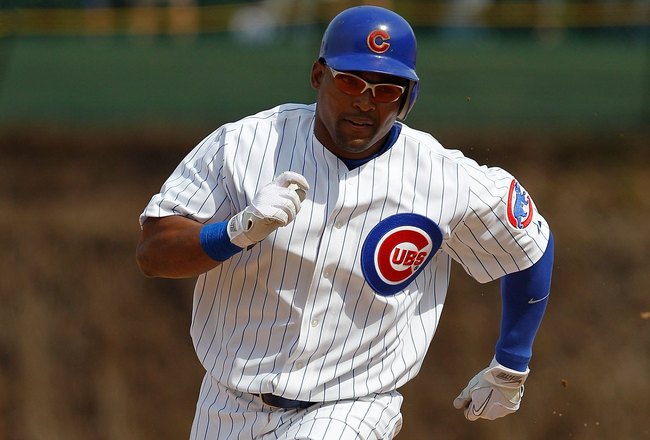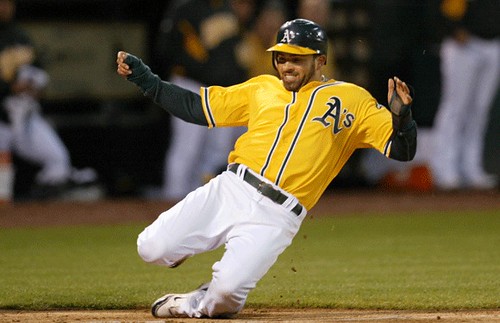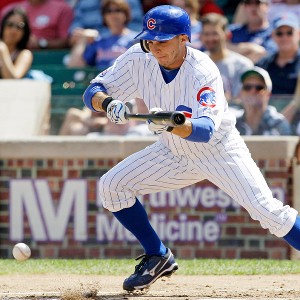 |
| You're not doing it right, Alfonso. When they say, 'use your head', they don't mean it like that. |
Although the past decade has seen all kinds of changes in the Wrigley outfield, 2012 will not bring drastic changes. At least, not right away.
For the fifth consecutive season, veteran Alfonso Soriano will man left field (he started 2007 in center). Soriano takes a lot of criticism for not living up to his gargantuan contract, and most of it is fair. It was a bad contract to begin with and there's little hope that he'll ever return to the form the Cubs thought they were getting.
In his outstanding 2006 season with the Nationals, his walk year, he became only the fourth player ever to have a 40-40 season with 46 homers and 41 steals. In five seasons since with the Cubs, he has totaled 54 steals. In his first two seasons with the Cubs he hit .291 with 62 homers and 38 steals while missing significant time to leg injuries both years. A reduction in steals was understandable, and the offense was definitely there so Cubs fans remained hopeful. However, a miserable 2009 showed that he had lost a considerable amount of talent from his glory days with New York and Texas. From 2009-11 he hit only .248 and averaged about 23 homers per season, a far cry from the 36 he averaged between 2004-06. He had lost virtually all speed, stealing just 16 bases between 2009-11.
Add all of those offensive woes to his already bad defense, and you've got an average to below-average player making $20 million per year now. Soriano flashed early power least season before again fading into the mediocrity Cubs fans have become accustomed to. It was almost a tease, but he could do it again and give the Cubs a legitimate power threat. He's not hard to get out because he still chases the sliders too much. 26 homers and 88 RBIs, however, aren't that bad if you ignore the average, contract, and defense. That's only one home run less than Adrian Gonzalez's total of 27, and as many RBIs as Justin Upton produced last season.
 |
| Center fielder Marlon Byrd |
The starting right fielder will be newcomer David DeJesus. DeJesus, like Soriano and Byrd, is on the wrong side of 30 although he is the youngest of the group at 32. If there's one thing that has defined his career so far, it's been his ability to get on base. He has a career .356 OBP with a career high of .384 from 2010. Playing all but one year of his career with the Royals, he has virtually no winning experience. Not even a year with Oakland in 2011 could change that.
 |
| Right fielder David DeJesus |
Now for the backups, part-timers, and call-ups. Bryan LaHair will presumably get some innings if not a few starts in the outfield after he started most of his major league games in right field last September. For a breakdown of his play, see the post below as he's also the starting first baseman. Ahead of him on the depth chart, however, are Tony Campana and Reed Johnson.
 |
| Speedy fourth outfielder Tony Campana |
The dude is seriously undersized at 5'8", 165 lbs., but he does play superb defense and hustles like no one else on the roster. His 'baseball kid' character shines through in a way reminiscent of former outfield utilityman Sam Fuld, but Campana brings the blazing speed Fuld didn't have on the basepaths. In the minors, Campana has stolen up to 66 bases. If he wants to use that speed in the majors, however, he'll have to prove he can get on base consistently.
Johnson, 35, never had speed anywhere close to Campana's. If you've seen Johnson chase down a dropping fly ball in left field, however, you might not have known that. Reed is also a definite fan favorite for his commitment to defensive play. It's not even that Johnson has some rocket arm he can show off to the fans; rather, he just hustles to every fly ball and looks like a complete natural diving for the ball, showing no fear. This kind of effort is what the fans want to see, and it was lacking on the 2011 team; especially from the player Johnson usually replaced in the late innings, Soriano.
 |
| Backup outfielder Reed Johnson |
Unless Soriano or Byrd are traded midseason, there is little chance that Johnson and Campana both remain on the major league roster all season. That's because top prospect Brett Jackson will probably debut sometime this season. Jackson was the organization's top draft pick in 2009 and so far the high status has paid off as he's been great in the minor leagues. The lefty-batting Jackson has 20-20 potential with solid defensive skills, projecting as the Cubs' future starting center fielder. I discussed Jackson more in-depth in my post on top prospects recently, read more about him here.
There's no doubt the outfield for the Cubs is an aging group right now. It's going to change a lot in the next few years, however, as I think Soriano and Byrd will both be gone by this time next season. Jackson should be the starting center fielder for years to come, and prospects Matt Szczur and Reggie Golden, neither of whom will debut in the majors this season, will play major roles in for the big league Cubs in a few years barring trades or free agent signings. The key question for the current group of Soriano, Byrd, and DeJesus is how much value is still left in these aging veterans? Can Soriano hit for a high enough average to make himself valuable in the trade market? Can Byrd stay healthy and prove his weight loss expands his abilities and delays his aging process? Can DeJesus fully recover from a bad season in Oakland last year?

No comments:
Post a Comment